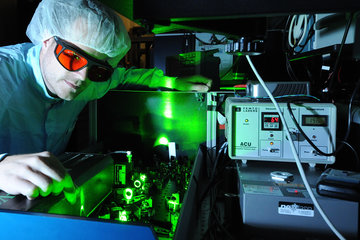Personalised depression therapy approach developed by the Max Planck Institute of Psychiatry wins m4 Award 2011
Federal State of Bavaria supports the development of a new class of potential antidepressants with a 500,000 € funding award
Together with the MPI of Biochemistry in Martinsried and the Lead Discovery Center (LDC) in Dortmund, the MPI of Psychiatry is set to develop active substances that influence the functioning of the human protein FKBP51. The researchers aim to exploit this mechanism of action to normalise the over-activity of stress hormones commonly observed in depressive patients. The new active substances would be used preferentially those for patients who suffer from this depression-related stress hormone imbalance. The five winners of this year’s m4 Awards will be announced on 18 July at the Bavarian Academy of Sciences and Humanities.

Felix Hausch, Marcelo Paez-Pereda and their research team were able to prevail over 75 other projects to win this award. “Currently, innovative drug discovery concepts for psychiatric diseases are hugely underrepresented in the pharmaceutical industry,” says Felix Hausch, Research Group Leader at the Max Planck Institute of Psychiatry. “The m4 Award enables us to translate the scientific insights gained by basic research into a novel drug discovery program for the treatment of stress disorders, such as depression,” explains the scientist. “In this way, we hope to set the foundations for a therapy that is tailored to the needs of the individual patient.”
The team around Professor Florian Holsboer, Director of the Max Planck Institute of Psychiatry, has been working on the personalisation of depression therapy for years. The mechanisms leading to the disease vary from one patient to the other. Patients therefore respond in very different ways to antidepressant. This is due to the individual biological constitution of those affected by the disease, which is explained, in turn, by the patients’ genes and the environmental influences to which they are exposed. Over half of patients suffering from depression display an altered stress reaction which is caused by a reduced response to stress hormones.
The project to be funded through the m4 Award aims to develop a completely new therapy for the normalisation of the stress-hormone regulation disorders typical of depression. The starting point for the drug to be developed is the protein FKBP51, an important regulator of the stress response. Researchers at the MPI of Psychiatry demonstrated in human genetic studies that FKBP51 plays an important role in the emergence of depression and other stress-induced diseases. In addition, studies in animal models showed that a reduction in FKBP51 causes the normalisation of the hormonal stress reaction and an improvement in depression-like symptoms.
Hausch and his colleagues build on the detailed information available for the atomic structure of FKBP51 to design new active substances that can inhibit the protein selectively. It is intended to make these active substances available to patients who suffer from disturbances in the cortisol feedback loop. Because this therapeutic approach differs mechanistically from existing antidepressants, the newly developed drugs could prove particularly effective in combination therapies for depression.
The m4 Award is part of the m4 Scouting & Incubation structural project implemented by the Munich m4 leading-edge cluster on Personalised Medicine. The awarding of the m4 Award within the leading-edge cluster is financed by the Federal Ministry of Education and Research (BMBF). Over the next five years, the Federal State of Bavaria will provide a total of 8.5 million euros in funding for the m4 Award for Bavarian pre-seed projects in the area of biotechnology with a particular focus on personalised medicine. On completion of the promotional period, the winning projects should be capable of attracting follow-up financing and, ideally, lead to the establishment of a company. The m4 Award is implemented by BioM and netzwerk nordbayern. The project partners are Technologietransfer-Stellen KFT (Ludwig-Maximilians-Universität München), TUM ForTe (Technische Universität München), Ascenion (Helmholtz Zentrum München, German Research Center for Environmental Health), Max Planck Innovation and Bayerische Patentallianz.
About the LDC
The Lead Discovery Center GmbH (LDC) was founded by Max Planck Innovation and the Max Planck Society to make better use of the potential of excellent basic research. The aim is to professionally transfer promising research projects into the development of new medications.












